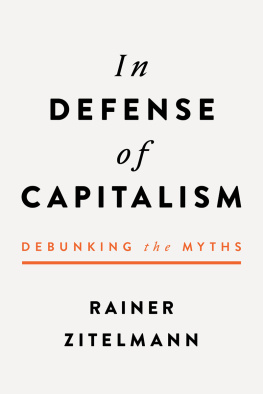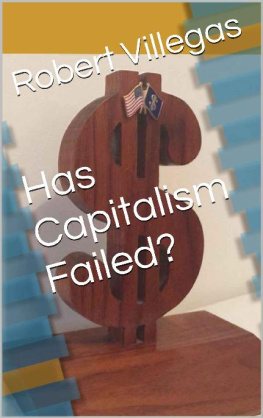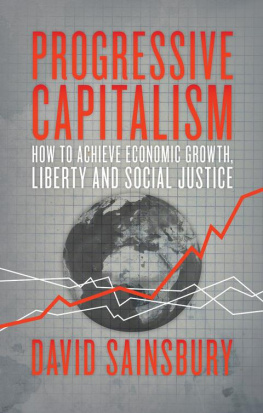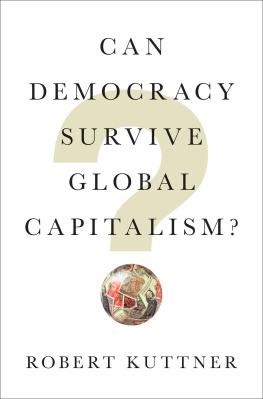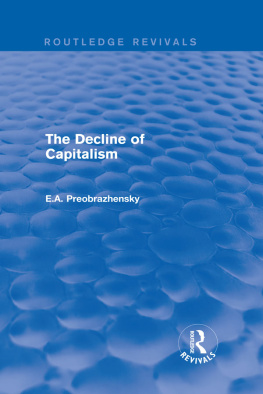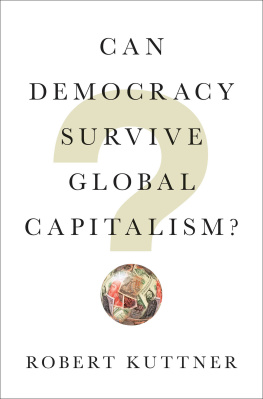THE CAPITALISM PAPERS
THE
CAPITALISM
PAPERS

Fatal Flaws of
an Obsolete System

JERRY MANDER
COUNTERPOINT
BERKELEY

Copyright Jerry Mander 2012
All rights reserved under International and Pan-American Copyright Conventions. No part of this book may be used or reproduced in any manner whatsoever without written permission from the publisher, except in the case of brief quotations embodied in critical articles and reviews.
Interior design by David Bullen
Cover design by Michel Vrana
Library of Congress Cataloging-in-Publication Data is available
ISBN 978-1-61902-218-8
COUNTERPOINT
1919 Fifth Street
Berkeley, CA 94710
www.counterpointpress.com
Distributed by Publishers Group West
10 9 8 7 6 5 4 3 2 1
This book is dedicated to the memory of my friend and colleague Edward (Teddy) Goldsmith, visionary, activist, compassionate inspirational leader, and the most charming, inclusive, kindest, and entertaining man I ever met. He knew everything in this book long before I did.
Table of Contents

QUESTION FROM THE AUDIENCE: Jerry, do you mean my grandfathers furniture store is killing the world? Is he one of those capitalists? Its a nice shop. Hes been there forty years, giving work to eight employees, and he pays a nice wage. With benefits. It doesnt seem bad to me.
JERRY: No, stores like that are really not the problem. We need to make distinctions when we talk about capitalism. The word covers too many different things. One distinction is this: Size matters! Small-scale local or family businesses, or community enterprises that make some money, pay salaries, send kids to college, and save a little, are not the problem, and never have been.
But lets say your granddad had somehow made gigantic profits from his store forty years ago, so he decided to partner with another store owner and invest in big real estate, converting small farms and open lands into shopping malls. And lets say they started franchising shopping centers around the world, and were borrowing from big banks to do it, and then started buying banks, and buying other companies doing unrelated stuff, like shipping or mining or biotech farming, and then started getting their financing from Goldman Sachs. Then they went public and were listed on the New York Stock Exchange as SHOP AMERICA! and they became friends with congressmen, spent 10 percent of their business income lobbying in Washington to overturn zoning, dumping, and other environmental laws that were getting in their way. And they had their eye on export trade subsidies, and maybe some military contracts, and were desperate to keep their stock prices high and to keep their taxes down.
Well, then, youd have to say your grandfather would be operating in a different world, with different values and drives, than he does now. At the beginning, it was all about furniture for local families and businesses, not the primary needs of nonstop capital expansion, growth, stock values, and distributions. Thats the capitalism I worry about. Thats whats consuming the world. Now its all about growth, not furniture, not sufficiency, not community welfare. Its wealth, constantly seeking more wealth, to better seek still more wealth. That local store and those global businesses really shouldnt share the same name. They are different creatures.

This book anticipates the final failure of the global economic project that we have lived by, accepted, and treated as if it were nearly a law of nature for more than two hundred years. The capitalist system was able to thrive, on and off, during the eighteenth, nineteenth, and twentieth centuries, when we still lived in a world of richly abundant cheap resources, cheap (or slave) labor, myriad colonial interventions, and lots of developing markets. But its now obsolete, nonmalleable, and increasingly destructive.
The system has reached a stage in its life span that is very familiar to ecologists and other students of natural evolution: A once thriving, even dominant species, in markedly changed physical circumstances, gives way to other species that are better adapted to current realities.
When applied to nature, its called natural succession. When speaking of economics, however, the ecological philosopher Ernest Callenbach describes the process as economic succession. I think hes got it right. The capitalist system had its day. If we care about the future well-being of humans and nature, its time to move on.
The situation becomes especially urgent now that were face-to-face with truly frightening macro-expressions of the limits of the earths basic carrying capacities, which until only recently had been largely ignored. These include:
(1) Climate change, caused mostly by excessive carbon emissions, advancing rapidly in all regions of the planet. This brings with it the loss of lands from drowningfrom ice cap runoffs and rising seasor desertification, giant storms, loss of productive capacities, physical dislocations, and horrific new weather patterns.
(2) Peak oil, and the imminent global shortage of inexpensive, safe energy from any source, including coal, gas, and nuclear. Abundant cheap energy was the key underpinning of Western civilization and our economic system over the last two centuries. Large-scale industrial production, long-distance transport, export food systems, complex urban and suburban systems, and commodities such as automobiles, plastics, chemicals, pesticides, refrigeration, and thousands of others are all based on the assumption of ever-increasing cheap energy. Alternative energy systems, highly touted now, can never become an adequate substitute, as we will explain.
(3) The global resource depletion crises. In addition to fuel, we face major oncoming scarcities of fresh water, arable soils, food grains, forests, biological and genetic diversity, wilderness, coral reefs, life in the oceans, and key industrial minerals including coltan, zinc, lithium, phosphorous, and rare earth elements. These shortages, among many others, put the survival of modern society in question.
(4) A global population now past seven billion, heading toward eight billion, exacerbating all other conditions.
(5) And the social, environmental, and geopolitical chaos that goes with all the above, already expressing itself in conflicts and wars over oil, water, and myriad other resources on land and in the sea, increased militarism, rising protests against systemic inequity, and fierce battles over increased cross-border migrations.
All of these crises share the same root cause: planet-wide immersion in a uniform economic system that requires continuous rapid growth and constant wealth expansion for its own viability, and in order to sustain the institutions and the people who sit at the top of the process. Such a state of permanent growth in turn requires never-ending expansion of resources, cheap labor, and unlimited waste disposal and absorption capacity. It also requires the universal promotion of a values system that equates perpetual commodity accumulation and personal and institutional wealth expansion with success and happiness. These are all impossible on a planet with finite resources and carrying capacities. The system is bound to fail.
Next page



